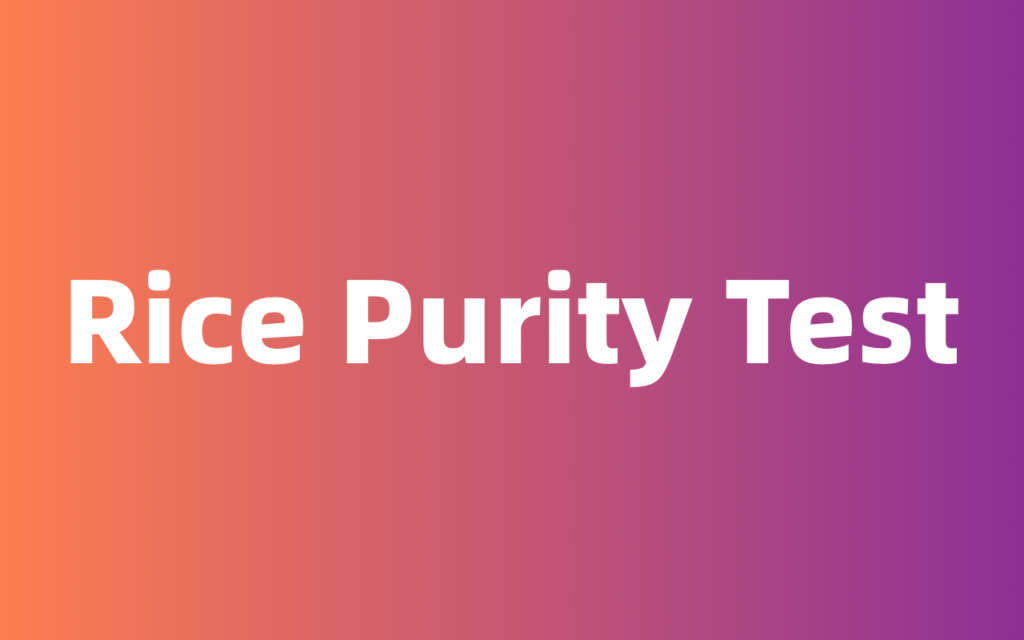The Rice Purity Test has become a fascinating topic among teenagers and young adults, especially in high school and college settings. Many use this test to gauge their experiences and to bond with friends. But what exactly does the rice purity test score mean? In this article, we will explore the origins of the test, its scoring system, and significance in today’s culture.
What is the Rice Purity Test?
The Rice Purity Test is a self-assessment quiz that originated at Rice University in Houston, Texas. It consists of questions about various life experiences, from innocent activities to more risqué ones. The aim is to determine how “pure” a person is based on their experiences.
- Origin: Developed by students at Rice University in the 1980s.
- Purpose: To create a light-hearted way for students to discuss their experiences and adventures.
- Format: A series of questions typically ranging from 100 to 200, covering various activities.
How Does the Test Work?
The rice purity test consists of statements that participants answer with either “Yes” or “No.” Each affirmative answer indicates an experience that moves the individual away from a “pure” score. For instance, experiences can range from mundane actions like eating sushi to more taboo actions like participating in illegal activities.
Scoring System
The scoring system is straightforward:
- Total Questions: Usually, there are 100 questions.
- Score Calculation: Your score is calculated by subtracting the number of “Yes” responses from 100.
- Example: If you answer “Yes” to 30 questions, your score would be 100 – 30 = 70.
Understanding the Score
The rice purity test score meaning can be interpreted as follows:
Score RangeInterpretation
90-100 Very Pure – Limited Experiences
70-89 Moderately Pure – Some Experiences
50-69 Average – Balanced Experiences
30-49 Low Purity – More Experiences
Below 30 Very Low Purity – Many Experiences
What Does Your Score Say About You?
So, what does the rice purity test score meaning reveal about a person? Here’s a closer look at the implications of different score ranges:
Very Pure (90-100)
If your score falls between 90 and 100, congratulations! This indicates that you have led a relatively sheltered life. You may be someone who:
- Enjoys simple pleasures.
- Hasn’t ventured into risky or wild experiences.
- Values a traditional lifestyle or holds onto a sense of innocence.
Moderately Pure (70-89)
A score in this range suggests you have had a few adventures but still maintain a sense of purity. You might:
- I have tried some new experiences but remain cautious.
- Engage in social activities but avoid excessive risk-taking.
- Be open to new things, yet prioritize safety and well-being.
Average (50-69)
An average score indicates a balanced lifestyle. You have likely:
- Engaged in various experiences while also maintaining some innocence.
- Had a mix of wholesome and adventurous moments.
- Developed a well-rounded perspective on life and relationships.
Low Purity (30-49)
Scoring in this range means you’ve explored many life experiences. You may:
- Be more open-minded and adventurous.
- Have taken risks and faced challenges that have shaped you.
- Engage in discussions about life experiences and learn from them.
Very Low Purity (Below 30)
If your score falls below 30, it suggests you’ve had numerous experiences that others might find shocking. This score indicates that you:
- Have likely engaged in risky behavior or made unconventional choices.
- You might possess a wealth of life experiences that contribute to your worldview.
- They could be seen as a trailblazer or someone who challenges norms.
The Social Aspect of the Rice Purity Test
One of the reasons the rice purity test has gained popularity is its ability to foster social interaction. Friends often take the test together, sharing laughs and stories about their experiences. This can lead to:
- Bonding Opportunities: The test serves as a way to connect with peers by sharing personal stories.
- Understanding Differences: It helps individuals understand where they stand compared to their friends, fostering discussions about choices and experiences.
- Encouragement to Share: People feel encouraged to open up about their past, creating a sense of community.
Criticisms of the Rice Purity Test
Despite its fun nature, the rice purity test is not without its criticisms. Here are some points to consider:
Oversimplification of Experiences
- The test reduces complex human experiences to a simple score, potentially overlooking the nuances of individual life choices.
- It may promote a narrow view of purity, leading to unnecessary comparisons.
Pressure to Conform
- Young individuals might feel pressured to conform to societal expectations based on their scores, leading to anxiety.
- Some may overemphasize their experiences to fit in with their peers, distorting their true selves.
Inaccuracy in Measurement
- The test’s validity as a measure of purity can be questioned. Not all experiences are inherently bad or good; a score should not define one’s value.
Conclusion: The Broader Implications of the Rice Purity Test Score Meaning
Understanding the rice purity test score offers more than just a glimpse into an individual’s experiences; it reveals insights into societal expectations and personal growth. Whether someone scores high or low, it’s essential to remember that every experience contributes to who we are.
Embrace Your Journey
- Every individual’s path is unique, and experiences can shape one’s values and beliefs.
- The rice purity test serves as a tool for reflection, encouraging participants to think about their choices and the lessons learned from them.



